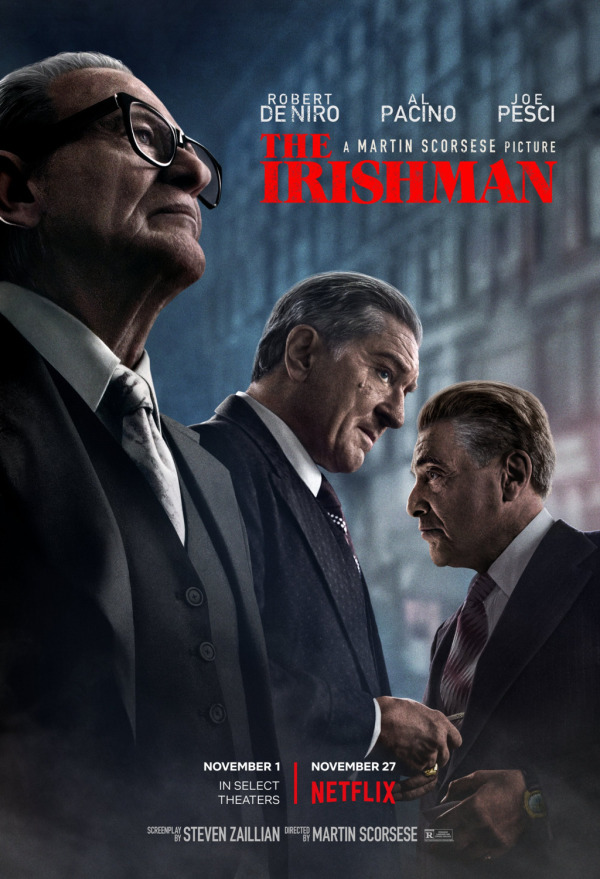THE IRISHMAN (directed by Martin Scorsese, 209 minutes, USA, 2019)
![]() BY DAN TABOR FILM CRITIC Based on the mob hitman memoir I Hear You Paint Houses, The Irishman is the “true” story of Irish Frank Sheeran (Robert De Niro), a blue-collar World War II veteran who made a life for himself in the Italian mafia hitman “painting houses” with the blood of his wiseguy victims. At the start of The Irishman, we meet Frank living out his final days in a nursing home as he reflects back on how he rose to the right-hand of not only Russell Bufalino (Joe Pesci, in what is arguably the greatest performance of his career), head of the Northeastern Pennsylvania Bufalino crime family, but also teamster leader Jimmy Hoffa (Al Pacino). Like watching a car crash in slow motion, we know from the get-go that Sheeran will eventually whack Hoffa which gives the three and a half hour epic a sustained and palpable sense of dread. Even with the film’s rather stark and unflinching perspective on the violence committed by Sheeran, Scorsese makes sure never to let the audience lose sight of emotional consequences Frank would face for betraying his lifelong friend.
BY DAN TABOR FILM CRITIC Based on the mob hitman memoir I Hear You Paint Houses, The Irishman is the “true” story of Irish Frank Sheeran (Robert De Niro), a blue-collar World War II veteran who made a life for himself in the Italian mafia hitman “painting houses” with the blood of his wiseguy victims. At the start of The Irishman, we meet Frank living out his final days in a nursing home as he reflects back on how he rose to the right-hand of not only Russell Bufalino (Joe Pesci, in what is arguably the greatest performance of his career), head of the Northeastern Pennsylvania Bufalino crime family, but also teamster leader Jimmy Hoffa (Al Pacino). Like watching a car crash in slow motion, we know from the get-go that Sheeran will eventually whack Hoffa which gives the three and a half hour epic a sustained and palpable sense of dread. Even with the film’s rather stark and unflinching perspective on the violence committed by Sheeran, Scorsese makes sure never to let the audience lose sight of emotional consequences Frank would face for betraying his lifelong friend.
The gangster genre has been the bread and butter of Scorsese’s career and quite deservedly gets a lot of love and a lot of hate. These films invariably glamorize a life of crime, rarely showing any real consequences, often killing our “heroes” off in a proverbial blaze of glory. With The Irishman Scorsese has come full circle, closing the loop he launched his career with when he turned his lens onto his New York upbringing in Mean Streets. We see the majority of Frank’s life in this film, narrated with a knowing perspective not afforded to younger generations. As Frank tells the story of his life from his nursing home wheelchair, there’s a pervasive sense of loss and regret that slowly ramps up as we see Frank choose this lonely path, eventually pushing everyone away or killing them with his bare hands. The film has the kind of voice that comes with age, experience and loss, and Scorsese and his cast here use it to gives us a rare and very depressing look at the life of a gangster.
My only complaint here would have to be the film’s de-aging technology and how in a few scenes it’s distractingly noticeable. That being my only qualm, this is still the only way you could tell a story that spans from one man’s twenties well into his eighties using the same actor. With a script that is nothing short of a master work, coupled with an intricate sense of production design and cinematography style, there is a filmmaking language here that is unmistakably deliberate. Scorsese is using the entire cinematic experience, everything from costume choices to music cues are used to tell this man’s story and engage the audience on this emotional journey. De Niro, Pacino and Pesci are at the forefront giving the kind of performances that show you why we regard these men as cinematic legends, with Pesci giving a more restrained performance that radiates a calm, collected but altogether deadly cool.

